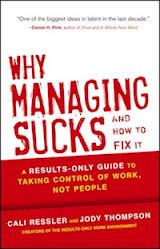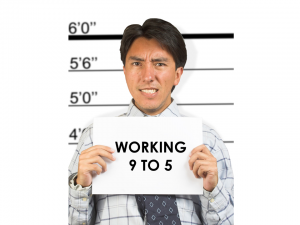
Guest Post By Cali Ressler, Co-Founder of CultureRx, LLC
 Giving your employees the freedom to do whatever they want, whenever they want as long as the work gets done does not equate to a no rules free for all. We are, after all, focused on results and employees must be held accountable for their results. So, how do you measure those results and hold employees and teams accountable?
Giving your employees the freedom to do whatever they want, whenever they want as long as the work gets done does not equate to a no rules free for all. We are, after all, focused on results and employees must be held accountable for their results. So, how do you measure those results and hold employees and teams accountable?
One thing we hear often is “If your employees aren’t in the office from 8-5, how do you know they’re working?” And our response is always the same: “Well, how do you know they’re working now?”
>>>HR is Not Flexible with Flexibility
We polled some of experienced managers in the ROWE Online Support Community and asked:
How do you measure accountability in a Results-Only Work Environment?
Omi Diaz Cooper, President of Diaz Cooper Advertising:
Here are some ways we measure accountability:
1. Deadlines met.
2. Projects adhering to expected standards
3. Client acceptance rate of projects
4. Number of mistakes/revisions
5. Project adhering to allotted budget
6. Profitability rates per department
7. # Client Referrals (Net Promoter score)
8. Peer Reviews
9. Performance against Position KPIs
>>>Results Through Flexibility
How do you measure costs and profitability in a Results-Only Work Environment?
Many get concerned about how to track costs and profitability for projects if you do not track when and where employees are working.
The answer for many is simple.
Ross Wright, President of FrogSlayer.
“You can work where you want, and when you want. You still have to keep track of how much time [spent on the project].”
Janelle Riley, President of Syvantis Technologies agrees.
“On Fixed Price contracts (where the client does not need to see hours) we still track time. This is the only way that we can accurately report financial results because we recognize revenue on a percentage of completion basis. However, this doesn’t tie anyone down. Our staff still manage their own projects, their own time, and their own client relationships. They just happen to show their time on their calendars.”
Diaz Cooper Advertising does it a bit differently.
“Under ROWE, you can still track hours per specific project, as long as employees know their compensation is not tied to those hours (It doesn’t matter when or where they do it, as long as they get it done within the project allotted hours.),” says Diaz Cooper.
>>>That Sucking Sound is People Leaving Your Company
How do you build a performance-driven work culture in a Results-Only Work Environment?
It doesn’t really matter if you are in a traditional work environment, or if you’re in a ROWE, you still have to have measurable results and hold employees accountable for work. Start building a performance-driven work culture by changing the way you set goals, as a company and as individuals. Employee’s goals and outcomes should always satisfy the ultimate customer and the ultimate outcome for your organization. .
How does your company measure accountability, whether in a ROWE or a more traditional work environment?
Order your copy of Why Managing Sucks and How to Fix It by Cali Ressler and Jody Thompson.
Cali Ressler, along with her business partner Jody Thompson, is the Founder of CultureRx and co-creator of the Results-Only Work Environment (ROWE). Her first book, Why Work Sucks and How to Fix It, was named “The Year’s Best Book on Work-Life Balance” by Business Week. She has been featured on the covers of BusinessWeek, Workforce Management Magazine, HR Magazine, Hybrid Mom Magazine, as well as in the New York Times, TIME Magazine, USA Today, and on Good Morning America, CNBC and CNN. Cali is also a nationally recognized keynote speaker and has presented to numerous Fortune 500 companies and prominent trade associations. Cali and Jody created ROWE based on the belief that the traditional solution of flexible schedules is not the answer to managing life’s many twists and turns.





